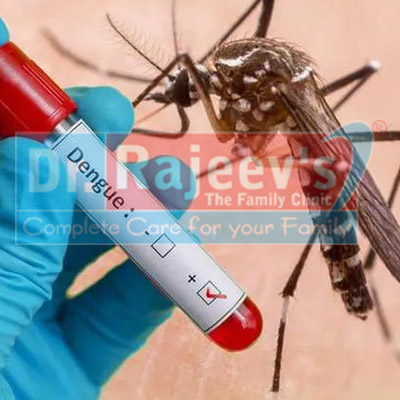

Dengue is a viral infection transmitted to humans through the bite of infected mosquitoes. The primary vectors that transmit the disease are Aedes aegypti mosquitoes and to a lesser extent, Ae. albopictus. The virus responsible for causing dengue, is called dengue virus.
In other words, this fever is called ‘break bone fever’. This is a specific fever lasting not more than 7 days. Its onset in with rigors, chilly felling followed by headache and a rapid rise of temperature.The tongue is furred and the conjunctiva is injected. Anorexia, vomiting, restlessness and insomnia may ensure. Often, within two or three days, a rash appears on the skin which is reddened.However,it gradually starts rising again and then it lasts for two or three days. A typical ‘saddle back fever’.
Many people experience no signs or symptoms of a dengue infection.
When symptoms do occur, they may be mistaken for other illnesses such as the flu and usually begin four to 10 days after are bitten by an infected mosquito.
Dengue fever causes a high fever — 104 F (40 C) — and any of the following signs and symptoms:
Most people recover within a week or so. In some cases,symptoms worsen and can become life-threatening. This is called severe dengue, dengue hemorrhagic fever or dengue shock syndrome.
Severe dengue happens when our blood vessels become damaged and leaky. And the number of clot-forming cells (platelets) in bloodstream drops.This can lead to shock,internal bleeding,organ failure and even death.
Warning signs of severe dengue fever which is a life-threatening emergency can develop quickly. The warning signs usually begin the first day or two after fever goes away, and may include:
Dengue fever is caused by any one of four types of dengue viruses.One can not get dengue fever from being around an infected person. Instead, dengue fever is spread through mosquito bites.
The two types of mosquitoes that most often spread the dengue viruses are common both in and around human lodgings. When a mosquito bites a person infected with a dengue virus, the virus enters the mosquito. Then, when the infected mosquito bites another person, the virus enters that person's bloodstream and causes an infection.
After you've recovered from dengue fever, you have long-term immunity to the type of virus that infected you — but not to the other three dengue fever virus types. This means you can be infected again in the future by one of the other three virus types. Your risk of developing severe dengue fever increases if you get dengue fever a second, third or fourth time.
One have a greater risk of developing dengue fever or a more severe form of the disease if:
Severe dengue fever can cause internal bleeding and organ damage.Blood pressure can drop to dangerous levels, causing shock. In some cases, severe dengue fever can lead to death.
Women who get dengue fever during pregnancy may be able to spread the virus to the baby during childbirth. Additionally, babies of women who get dengue fever during pregnancy have a higher risk of pre-term birth, low birth weight or fetal distress.
EUPATORIUM PERF : Homeopathic medicine for dengue fever with pain in bones, as if broken with burning heat.Given when sweat relieves all symptoms, except headache.There is nausea, vomiting at the close of chill or hot stage.Also there is throbbing headache.Given when person knows the chill is coming because despite being thirsty, cannot drink. Useful when paroxysm of fever usually commences in the morning.
RHUSTOX - Given for dengue when fever starts with great restlessness,stiffness and soreness.There is extremely chilly with a dry cough,inflammation of the eyes, dilatation of the pupils and great restlessness, worse by rest. Movement relieves the condition.e.t.c
RL-11